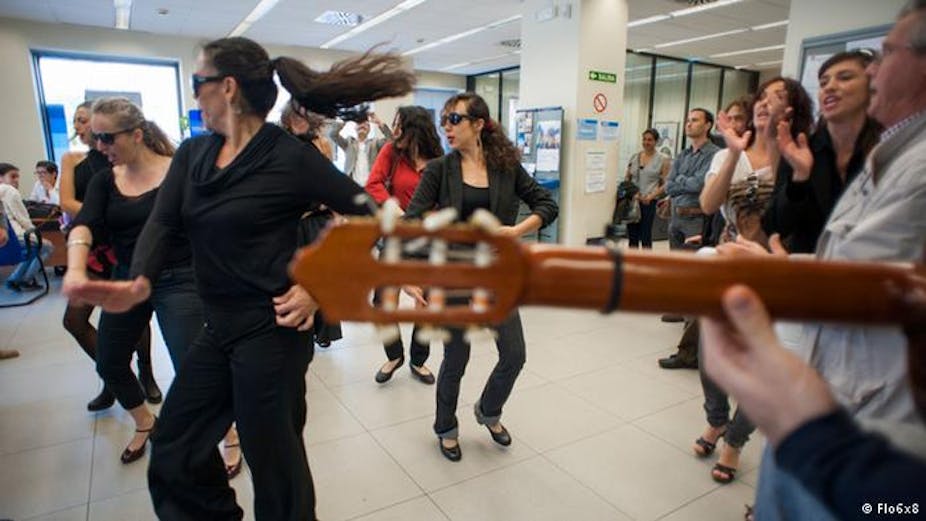Flamenco is perhaps Spain’s most alluring cultural phenomenon, characterised by the stereotypes of sun, passion and tumbling black hair. Political protest and social activism are less likely to come to mind when thinking of flamenco, but for some performers it has always been a powerful tool for voicing political protest.
Never more so than today. Spain has suffered immensely in the global economic crisis – especially Andalusia, the southernmost region of the country most associated with flamenco. Neoliberalism has taken its toll on the Spanish people, who are suffering one of the highest levels of unemployment in Europe. In 2011, this led to the infamous 15M (indignados) protest movement that mobilised millions of citizens across the country to challenge policies of austerity following the banking crisis.
On the back of this movement, the flashmob group Flo6x8 has rebranded flamenco as a powerful political weapon. This anti-capitalist group has been well publicised for its political performances that have taken place in banks and even the Andalusian parliament. Using the body and voice as political tools, the group carries out carefully choreographed acciones (actions) in front of bemused bank staff and customers. These performances are recorded and then posted online, attracting a huge number of views.
Through explicitly political lyrics, Flo6x8 denounces the banking crisis and the austerity measures resulting from European bailouts. By claiming public, capitalist spaces the performers give a powerful political message that challenges the status quo. But these performances also break with typical gendered stereotypes in flamenco. The exotic, seductive and “oriental” image of the female dancer is turned on its head. Instead the female dancers in these performances become powerful, political figures.
The group believes it is repoliticising flamenco, returning to its historical origins. Nowadays flamenco is closely associated with the world music industry and tourism. Yet the origins of flamenco tell a different story. Flamenco was born among socially marginalised communities such as Gypsies, miners and other disadvantaged Andalusian groups. Lyrics from the 18th and 19th centuries tell tales of poverty and social hardship.
True, the flamenco we know today owes much of its legacy to the commercial theatres (cafés cantantes) of mid-19th century Spain. But its political side has come out during times of social upheaval. Republicans during the Spanish Civil War sang ideological messages. And singers of the 1960/70s such as Manuel Gerena and José Menese challenged the Franco regime in pursuit of democracy and equality.
I want to say with passion, this fandango that I sing, Spain is Republican. And this is from the heart, down with the law and tyranny.
Flo6x8 see themselves as the continuation of this political legacy, where flamenco becomes a catalyst for social change as can be seen by this anti-austerity flashmob in the Andalusian parliament in June 2014.
The controversial new gag law introduced by the Spanish government in 2015 has restricted the activities of Flo6x8. Yet members remain committed to flamenco as a political weapon against continued social and economic inequalities in Spain.
Confronting racism
The history of flamenco has also been used to promote tolerance. Flamenco is said to have links to Spain’s Islamic past a period when Christians, Jews and Muslims allegedly coexisted in peace (convivencia). Although criticised by some as a utopian myth, convivencia carries a message of tolerance for today. Many argue that flamenco emerged from an amalgamation of cultural influences in southern Spain: Arabs, Jews, Gypsies, African slaves, Andalusian underclasses and so on. The belief, then, is that flamenco is born of intercultural dialogue.
However, Spain’s relationship with its Islamic past is problematic. In some quarters it is celebrated – in others it is shunned. Since the 1980s, increasing immigration into Spain, particularly from Morocco, has complicated matters. Like in many countries across Europe, racial tensions and Islamophobia have increased. Here flamenco has been used to confront racial tensions and promote tolerance.
In 2003, the dancer Ángeles Gabaldón and her company premiered the show Inmigración (Immigration), which was also broadcast online to more than 50,000 people. Inmigración raised awareness of the humanitarian issues surrounding migration across the Strait of Gibraltar: human trafficking, migrant deaths, immigrant sex work and racism.
The show, which featured a multiracial cast, sought to raise awareness of the social reality of immigration – and, interestingly, also presented Spain’s own history of emigration before it became a country of immigration. But the most powerful element of Inmigración was how the past and the present were joined together in musical performance. Flamenco was combined with musical styles believed to have originated in Islamic Spain that now exist in North Africa.
The cast included Jalal Chekara, a Moroccan performer who has lived in Spain for many years. He is known for his collaborations with flamenco musicians, promoting tolerance through the musical re-imagining of a shared cultural history.
Since 2003, the situation across Spain and Europe has deteriorated. The current migrant crisis is maybe the most difficult challenge facing Europe and Inmigración is perhaps even more relevant today than when it was first performed. It shows the capacity of flamenco as a form of social criticism that can give power to the powerless and voice to the voiceless.
Joshua Brown, a lecturer in Ethnomusicology at Chapman University and Juan Pinilla, flamenco singer and writer in Granada, assisted with research for this article. The author will be appearing at the Cambridge Festival of Ideas.

